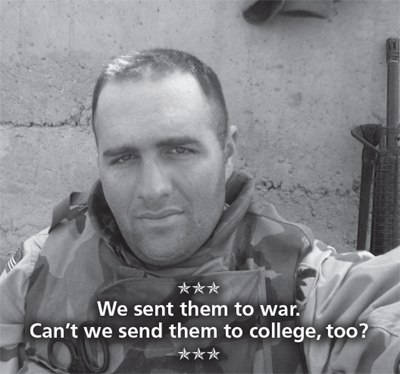
In 1944, President Franklin Delano Roosevelt signed into law the "Servicemen's Readjustment Act," better known as the GI Bill. With that one signature, the President ensured that eight million combat veterans coming home from Germany and Japan would be able to afford an education. The World War Two GI Bill was the Cadillac of scholarships; it covered tuition, fees, and books, and gave veterans a living stipend while they were in school.
And it was worth every penny. A 1988 Congressional study proved that every dollar spent under the original GI Bill added seven dollars to the national economy in terms of productivity, consumer spending and tax revenue. Before I served in Iraq, I worked on Wall Street. We used to talk about ROI - "return on investment." By any standard, the GI Bill was a good buy.
But today, we are not investing in our troops like we did after World War Two. After contributing up to $1,800 from their first military paychecks, today's troops can receive about $45,000 towards their education. That covers only 60-70% of the average cost of four years at a public college or university, or less than two years at a typical private college. The process to get these limited benefits is complicated. Troops have to front the money to their college, and then get paid back by the government in monthly installments. No wonder only 8% of troops even use their whole GI Bill benefit.
We can do better. This year, Congress is taking action on a new GI Bill. The new bipartisan bill, originally introduced by Senator Jim Webb of Virginia, would make a college education affordable to every service member returning from Iraq and Afghanistan. Senator Webb is a decorated Vietnam veteran who knows firsthand the struggles combat veterans face to rebuild their lives once they come home. He's committed to helping those veterans - and so far, 100 Senators and Representatives have signed on to his legislation.
President Roosevelt said that the original GI Bill gave "emphatic notice to the men and women in our armed forces that the American people do not intend to let them down."
We have an opportunity to show the same support for a new Greatest Generation. Instead of hearing about a flood of homeless Iraq veterans, we could be building a generation of leaders. This Veterans Day, you can do more for the troops than just go to a parade. Go to www.IAVAaction.org and tell your representatives to make a new GI Bill their priority in 2008.
Washington politicians say they support the troops. Signing on to support a new GI Bill gives them a chance to put their money where their mouths are.